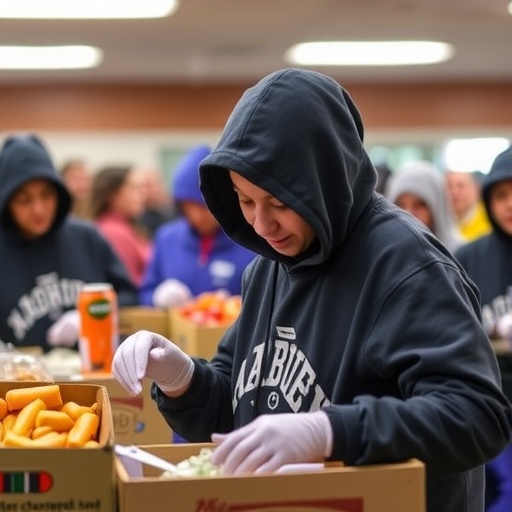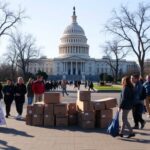Government Shutdown Day 26: Federal workers Desperately Turn to Food Banks as Economic Impact Deepens
In a stark illustration of the human cost of political gridlock, Federal workers across the United States are lining up at food banks for the first time in their lives as the government shutdown stretches into its 26th day. Once symbols of stability with steady paychecks and benefits, these essential employees—ranging from park rangers to air traffic controllers—are now facing unpaid bills, empty pantries, and mounting anxiety, with no end in sight to the impasse over border funding.
The shutdown, triggered by disagreements between President Donald Trump and congressional Democrats on immigration policy, has furloughed over 800,000 Federal workers and left another 1.2 million working without pay. As the economic impact ripples through communities, charities and food banks report a surge in demand, painting a picture of widespread hardship that extends far beyond Washington, D.C.
Federal Workers’ Heartbreaking Tales of Survival
For Sarah Jenkins, a 42-year-old IRS auditor from Alexandria, Virginia, the shutdown has transformed her routine life into a daily battle for basics. “I’ve always prided myself on being self-sufficient,” Jenkins shared in an emotional interview with local reporters. “But after 26 days without a paycheck, I found myself at a food bank yesterday, picking out canned goods for my two kids. It’s humiliating, but hunger doesn’t care about pride.”
Jenkins is not alone. Stories like hers are emerging nationwide. In Denver, Colorado, a group of National Park Service employees, furloughed since the shutdown began, organized a carpool to a local food pantry operated by Feeding America. “We’re the ones who keep the parks running,” said ranger Mike Thompson, 35. “Now we’re relying on the kindness of strangers just to eat.” According to a survey by the National Treasury Employees Union, nearly 40% of affected federal workers have dipped into savings, while 25% have turned to food banks or charitable assistance.
The psychological toll is equally profound. Mental health experts note a spike in calls to crisis hotlines from federal families. Dr. Elena Ramirez, a psychologist specializing in economic stress at George Washington University, explained, “This isn’t just about missing a paycheck; it’s the uncertainty that’s eroding their sense of security. Federal workers are trained to handle crises, but this one hits home in ways they never imagined.”
Statistics underscore the scale: The U.S. Department of Agriculture reported that food insecurity among government employees has risen by 300% in shutdown-affected areas. In the Washington, D.C., metro region alone, Capital Area Food Bank saw a 150% increase in visitors last week, with federal ID badges becoming a common sight in line.
Food Banks Overwhelmed by Shutdown Surge
Local food banks, already stretched thin by holiday demands, are now grappling with an unprecedented influx tied directly to the government shutdown. In Atlanta, Georgia, the Atlanta Community Food Bank distributed over 50,000 emergency meals in the past two weeks—double their usual volume—much of it to federal workers from nearby military bases and FAA facilities.
“We’ve had to ration supplies and extend hours just to keep up,” said executive director Lisa Parker. “These aren’t the typical clients; they’re professionals who’ve fallen on hard times through no fault of their own.” Parker’s team has partnered with local businesses to stock shelves with non-perishables, but donations are lagging behind the demand spike.
Across the country, similar scenes unfold. In Seattle, Washington, where Boeing-related federal contracts amplify the pain, the North Helpline food bank reported serving 1,200 federal workers in a single day last week. Volunteer coordinator Jamal Hayes noted, “People are coming in suits and ties, explaining their situation with tears in their eyes. It’s a wake-up call to how fragile our support systems are.”
The economic impact is quantifiable: A report from the Brookings Institution estimates that the shutdown has cost the U.S. economy $11 billion so far, with federal workers’ lost wages alone totaling over $2 billion. Food banks, funded largely by private charity, are absorbing an additional $50 million in emergency distributions, straining resources meant for year-round hunger relief.
- Increased Demand Metrics: National food bank networks like Feeding America project a 20-30% rise in overall usage by month’s end if the shutdown persists.
- Regional Hotspots: Areas with high federal employee concentrations, such as Maryland, Virginia, and California, report the sharpest increases.
- Volunteer Boost: Community response has been robust, with a 40% uptick in donations from sympathetic citizens.
Yet, experts warn that charity alone can’t sustain this burden. “Food banks are a band-aid,” said policy analyst Tom Wheeler from the Center on Budget and Policy Priorities. “Without congressional action, we’re looking at a humanitarian crisis unfolding in plain sight.”
Economic Impact Echoes Through Families and Communities
The government shutdown’s tentacles reach deep into everyday American life, amplifying the economic impact far beyond federal workers’ kitchen tables. Small businesses near federal installations, from D.C. delis to California contractors, are reporting revenue drops of up to 50%, leading to layoffs that compound the hardship.
Take the case of Rodriguez’s Grocery in Silver Spring, Maryland, a staple for federal commuters. Owner Maria Rodriguez lamented, “My regulars—those government folks—haven’t been in for weeks. I’m down 30% in sales, and I’ve had to cut hours for my staff.” This ripple effect is nationwide: The Partnership for Public Service estimates that for every furloughed federal worker, three private-sector jobs are indirectly affected.
Families are improvising in desperate ways. In a poll by NPR, 60% of federal households reported delaying medical care, 45% skipping meals, and 35% using credit cards for essentials. Single parents, like Navy veteran and civilian contractor David Lee from San Diego, face acute challenges. “My daughter’s school lunch program is a lifeline now,” Lee said. “The shutdown isn’t just politics; it’s stealing from our children’s future.”
Broadly, the economic impact includes a projected 0.2% drag on GDP growth for the quarter, per Moody’s Analytics. Stock markets have wobbled, with defense and aviation sectors hit hardest. Moreover, delayed federal services—like tax refunds and loan processing—are bottlenecking consumer spending, further slowing recovery in vulnerable communities.
- Short-Term Losses: Unpaid federal workers have forgone $3.5 billion in disposable income, per the Congressional Budget Office.
- Longer-Term Fears: Credit scores are dipping as bills pile up, potentially affecting home loans and job prospects.
- Community Strain: Local governments in federal-heavy states are diverting funds to emergency aid, straining budgets already tight from natural disasters.
As the shutdown drags on, economists like Dr. Laura Tyson from the University of California warn of a “shutdown fatigue” that could erode consumer confidence nationwide, turning a political standoff into a broader economic downturn.
Charity Networks Mobilize in Crisis Mode
In the absence of federal paychecks, charity organizations have become the unsung heroes bridging the gap for struggling federal workers. Groups like the United Way and Catholic Charities have launched targeted campaigns, raising over $10 million in the past month specifically for shutdown relief.
The Salvation Army, with outposts in every state, has repurposed holiday drives into ongoing support hubs. “We’ve distributed 100,000 care packages containing groceries and utility assistance,” reported national spokesperson Emily Carter. “Federal workers are calling our hotline daily, and we’re connecting them to food banks and financial counseling.”
Innovative responses are emerging too. A GoFundMe initiative by federal unions has amassed $2.5 million from donors, funding direct cash transfers to the most needy. Meanwhile, tech platforms like Amazon and Google have matched employee donations, funneling aid to food banks in high-impact areas.
However, charity leaders emphasize the limits of private giving. “We’re patching holes, but the government shutdown is flooding the dam,” said Feeding America’s CEO Claire Babineaux-Fontenot. “Sustainable solutions require policy change, not perpetual philanthropy.” Quotes from beneficiaries highlight the gratitude mixed with frustration: “These organizations saved us this month,” said one anonymous TSA worker, “but how long can we keep asking for help?”
The surge in charity involvement also spotlights inequities. Rural federal workers, often farther from urban food banks, face steeper barriers, prompting mobile pantries from groups like World Central Kitchen to fan out across the Midwest.
Negotiations Stall as Shutdown Relief Remains Elusive
With federal workers queuing at food banks and the economic impact mounting, bipartisan calls for resolution grow louder, yet negotiations in Congress remain deadlocked. House Speaker Nancy Pelosi has accused the White House of intransigence, while Senate Majority Leader Mitch McConnell urges compromise on border wall funding.
President Trump, in a recent tweetstorm, reiterated his stance: “No wall, no deal.” Democrats counter with offers for increased border security sans the wall, but talks have yielded little progress. Lobbyists from unions like the American Federation of Government Employees are pressing lawmakers, warning of “irreversible damage to public service morale.”
Looking ahead, the implications are dire if the shutdown extends beyond day 30. Analysts predict mass resignations among federal workers, exacerbating staffing shortages in critical areas like cybersecurity and disaster response. The IRS, already understaffed, faces a nightmare for the upcoming tax season.
Relief efforts continue apace: Treasury Secretary Steven Mnuchin has floated emergency loans for federal employees, but uptake is low due to interest concerns. Community leaders advocate for a “shutdown safety net” bill, which could provide retroactive pay and expanded unemployment benefits. As winter deepens and holidays approach, the pressure mounts for a breakthrough—lest the human cost of this government shutdown etch itself into the nation’s memory.
In the coming weeks, watch for intensified advocacy from affected workers and potential court challenges to the shutdown’s legality. For now, food banks and charities stand as precarious lifelines, underscoring the urgent need for Washington to prioritize people over politics.








